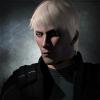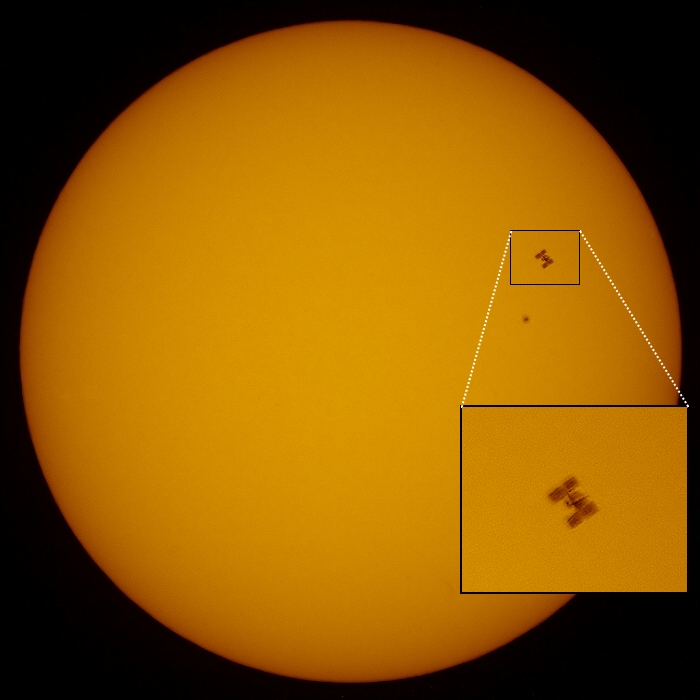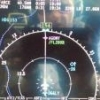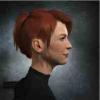
Ever tried to spot the ISS?
#1

Posted 28 November 2011 - 11:58 AM
Don't be confused by the viewing tables if you don't understand them immediately. Magnitude refers to how bright an object is. The lower the number the better with negative numbers being particularly bright and higher numbers being much fainter. For instance, if you live in a town or city with light pollution you will be lucky to see anything fainter than maybe magnitude 3.0. Betelgeuse, the star at the top left of Orion is around 0.4, while Jupiter is particularly bright at about -2.0. Azimuth simply refers to points on the compass, while altitude is the height in degrees above the horizon i.e 0 degrees at the horizon and 90 degrees being directly overhead. There are other tables for other satellites, Tiangong and Iridium flares, but stick with the ISS for now
Anyway, pick yourself a decent pass with good level of brightness. Passes with a higher max altitude will usually be easier to spot and will last a little longer, but of course you are always at the mercy of the weather. If you don't know your north from your south check a compass, have a watch ready and that's it. It appears as a very bright white star which you could confuse with a passenger plane, but you won't see any of the flashing lights you normally see on an aircraft. It will pass over reasonably quickly with a pass from one horizon to the other lasting no more than around five minutes or so. It may suddenly blink into vision as it appears from the Earth's shadow (remember what you see is reflection of sunlight) or it can suddenly blink out as it enters it. It makes the mind boggle when you realise it's travelling at over 17000 miles an hour and I never tire of it.
Have a go if you haven't already and children particularly will love it. Also I apologise to those of you who know much more about this sort of stuff than I.

BASIC-20100220 WOLFPACKS-1203102200
Watch me paste this pathetic palooka with a powerful, paralyzing, poifect, pachydoimous, percussion pitch.
#3

Posted 28 November 2011 - 12:13 PM
#4

Posted 28 November 2011 - 12:19 PM

BASIC-20100220 WOLFPACKS-1203102200
Watch me paste this pathetic palooka with a powerful, paralyzing, poifect, pachydoimous, percussion pitch.
#5

Posted 28 November 2011 - 12:47 PM
#6

Posted 28 November 2011 - 01:15 PM
#8

Posted 28 November 2011 - 03:26 PM
#9

Posted 28 November 2011 - 04:16 PM
Next time i'm coming home at night, i will take a look skyward to see what i can see...! Thanks for mentioning this!
Cool. Just remember that not all passes are visible and you can (particularly in Summer) go without visible passes for a couple of weeks.
We sometimes get a little extra from the ISS down here
Of course, where else
Hi Deran,
Check out http://catserver.ing.iac.es/staralt/ for detailed Ephemeris of any arbitrary position.
Have you managed to photograph the green flash yet?
Thanks Ksharaa

BASIC-20100220 WOLFPACKS-1203102200
Watch me paste this pathetic palooka with a powerful, paralyzing, poifect, pachydoimous, percussion pitch.
#11

Posted 28 November 2011 - 06:33 PM
MORAL, adj. Conforming to a local and mutable standard of right. Having the quality of general expediency.
#12

Posted 28 November 2011 - 08:45 PM

#13

Posted 29 November 2011 - 12:54 AM
A&W - 0271220081700 (Adv-Pvp #100 / Wolfpacks #16)
COVOPS - 1804090001 (Class Admin)
____________________________________________________________________________________________
"Those who would give up essential liberty to purchase a little temporary safety deserve neither liberty nor safety."
Benjamin Franklin, Historical Review of Pennsylvania, 1759
-AB1TA
#14

Posted 29 November 2011 - 04:24 AM

#15

Posted 29 December 2011 - 04:24 AM
Hey, considering I was just outside Columbus, OH, the fact that we could see any star that night with the common clouds, humidity, and immense light pollution is amazing!
Lecrosis- the ISS will get larger, but it will not need to be accelerated to keep orbit. Orbits are independent of mass, as counter-intuitive as that may seem.
#16

Posted 29 December 2011 - 04:51 AM


















